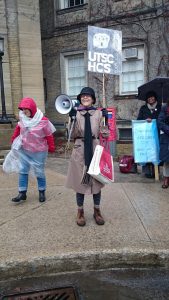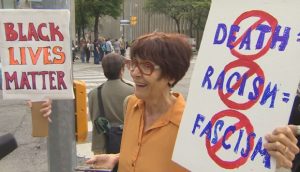
When I learned this May of George Floyd’s murder by a stony-eyed Minneapolis policeman, I had been living in Toronto for six years. Sadly, I was not surprised to receive such horrific news from my former hometown.
George Floyd’s death forced me to recall a day when I had personally encountered Minneapolis cops abusing a Black man, and I had failed to respond with any kind of action. It is a painful memory. I write about it now because I hope others too are reflecting on similar events and, like me, pondering how to prepare to better meet the inevitable future moments when they are again challenged to “do the right thing.”
I no longer recall the exact date, but it was probably about ten years ago. It was late winter, a cold and damp Minnesota afternoon, with the light darkening swiftly to purple as it fell on leaking piles of dirty ice at sidewalk’s edge. I had just checked out several knitting books from the upper-floor shelves of the Minneapolis public library, and I was eager to reach the Hennepin Avenue bus stops, aware that I was late and that I was scheduled to cook that evening’s dinner.
As I emerged from the elevator into Cesar Pelli’s beautiful central atrium, I saw a scrum of policemen gathered around a young Black man. No, I should be more precise: this was no man, this was certainly a kid, perhaps fifteen or sixteen years old. The boy was sobbing wildly and crying out. Tears and snot ran down his face as he howled. He appeared to be shackled to the wall. Police officers stood by impassively. They were four or five big men with blank faces, casually consulting their watches and talking on their phones.I froze. A kid? Shackled? To a wall? In the library? My moral sensibilities—which I always think of as emerging from my guts—told me to scream at them to “stop.” My heart pounded. The physiological demand was to fight or to flee.
And flight had already commenced. Patrons young and old, Black, White, Asian, short and tall, male and female, hurried through the atrium. All wore big winter coats; all showed signs of visible agitation; all were moving fast. The homeless people who often sheltered against the Minnesota cold just inside the Hennepin Avenue lobby were pushing through the glass doors and in a hurry to leave.
What had they seen?
I do not know. But in a split second I followed, hustling myself out of the building, trying to separate myself from the horror of what I clearly knew I had seen.
In the days that followed, I looked for, but I never found a newspaper report on this event. Perhaps it seemed too ordinary to put into print. It was of course no ordinary memory for me. I spoke to few others about it, yes, but then I wrestled with myself, ashamed, angry, and scared. To this day, I do not know the boy’s name.

In many ways—or so I thought at the time—I had been well prepared to take action that day. A White, Italian-American, first generation college student of working class and rural origins, I had graduated from high school during the 1967 urban rebellions. In college I was a sociology student who began reading in Black Studies: I bought and read the Kerner Commission report, I read classic works of Black sociology, I found and was excited by the writings of Angela Davis. I’m not proud to admit but once,—short on cash—I even shoplifted a copy of Bobby Seale’s Seize the Time from my local bookstore. I remained a small-time feminist, a distributor of My Body, Myself, an anti-war-striker, a marcher. I turned out for a 1970 New England rally in support of Black Panther militants during their New Haven trials. And when I entered graduate school in History at the University of Michigan, I became a proud union activist in the Graduate Employees Organization (GEO). I stood on picket lines; I helped write a letter of agreement on Affirmative Action; I designed picket signs. I was arrested.
All this means is that I came to Minnesota fully aware of the state’s history of anti-Semitism and the history of racism in the United States. I saw immediately that “Minnesota Nice” did not produce equal educational, housing or occupational outcomes for Black Minnesotans or for American Indians. As Director of the University’s Immigration History Research Centre, I worked intensively every day with students from Minnesota’s Hmong, Somali, and Mexican communities and with international students from around the world. We organized projects and programs to bring together the children and grandchildren of earlier European immigrants with the newest of newcomers, hoping to assure that all Minnesotans understood the challenges outsiders still face in their prosperous and very White state.None of it had helped. What I had learned in the downtown library, I concluded, was that intellectual awareness of American racism and commitments to collective action in pursuit of justice had not created a solid enough foundation for me to take individual action. I had witnessed something very, very wrong, and I had failed to act.
As I see it now, retrospectively, in 2020, I had faced a moment of moral decision-making—a “moral moment.” I continue to believe I failed that moral test. I still know how to mobilize collective action–in the aftermath of the 2017 White supremacist violence in Charlottesville, a Toronto friend and I brought out 150 people to protest in front of the U.S. Consul. Yet I still lack confidence that I can, as an individual, face the next moral moment with any greater clarity than I had in Minneapolis.

2020 will remain, for me at least, a year of searching for additional and new strategies for personal change. Mass movements remain important and necessary; mid-pandemic, my 70-year-old self can and still will mask up to hit the street. Yet my sense of what needs doing is very much in flux and it is increasingly turned inward.
For the moment, I’m impressed by how the Black Lives Matter Movement foregrounds the importance of individuals—insisting that we “Say Their Names”—even while mounting week after week of collective action. I am inspired to have painful discussions with White friends about what it means to take responsibility for institutions that create the inequities we all can see around us. I seek memoirs and biographies of individual White anti-racists of the past, as well as ones living today. I no longer doubt that religious faith has offered many Black and White Americans meaningful preparation for facing their own moral moments. I also know that is not the font from which I am likely to draw.For the months ahead, then, my intent is to listen hard to good people with good ideas about how to prepare ourselves, our students, our children and grandchildren for their own moments of moral decision. On my short list for now are those who advocate for training in non-violence and those who believe their training in self-defense developed in them the strength to intervene—quietly and sometimes also with humor—in conflicts that threaten violence.
I am sure there are other paths to the next moral moment. I will continue to seek.
Toronto, Canada
July 15, 2020
Previous Reflection Next Reflection
Return to the Wonderful/Wretched Series introduction.
